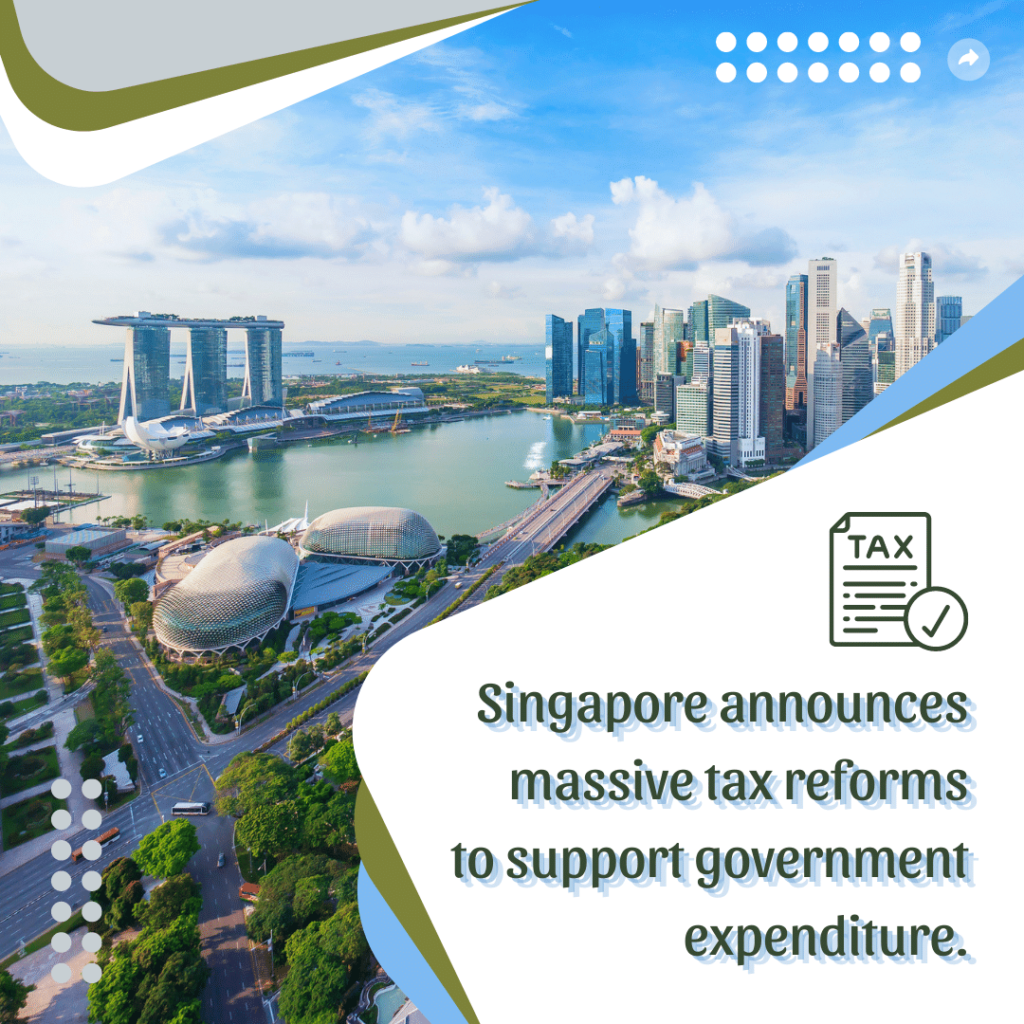 0
0
SHOPPING CART

Singapore proposed a series of progressive tax reforms on Friday (February 18) to raise income to support extensive programs needed over the next several years and tackle socioeconomic disparities. In response to concerns about rising costs, the increase in the goods and services tax (GST) to cover the recurrent social and healthcare demands of a rapidly aging population was postponed until 2023.
Over two years, the increase will be phased, with GST rising from 7% to 8% on January 1 next year and then to 9% on January 1, 2024. The increase’s impact will be mitigated, particularly for low-income households.
The wealthy will also pay a higher share of other taxes. “Those who earn more, contribute more,” Finance Minister Lawrence Wong said in his first Budget since taking over the portfolio in May last year, as he outlined increases in personal income, property, vehicle, and carbon taxes as part of an expansionary $109 billion Budget that included special transfers.
He also announced a $6 billion draw on reserves as part of Singapore’s ongoing fight against Covid-19, as well as more than $1 billion in assistance to companies, homes, and individuals affected by the epidemic.
In terms of future problems and possibilities, Mr. Wong stated that he would devote $900 million to encourage enterprises to invest in new skills while tightening personnel restrictions to guarantee “proper caliber” foreign employees.
This year’s Budget is likely to run a $3 billion deficit, despite Mr. Wong’s cautious optimism as Singapore enters a time of transition and recovery after two years of dealing with the epidemic and its aftermath. “The global economy is exposed to pandemic-related threats as well as potential supply chain disruptions. Geopolitical and security concerns are on the horizon, “He cautioned at the opening of his two-hour-long lecture. “We may also witness a downturn in foreign demand as big nations reduce epidemic support, and central banks tighten accommodating monetary policies to combat the threat of inflation.”
But, barring more interruptions, Mr. Wong expects the Singapore economy to continue to perform well, growing by 3% to 5% this year. Looking ahead, with government spending expected to rise dramatically in the future years, particularly in healthcare, he believes that changes to Singapore’s tax structure would be required to generate more money. “That implies that everyone pitches in and contributes to a thriving economy and a stronger social compact, but those with more resources give a larger proportion,” said Mr. Wong, who also co-chairs a multi-ministerial task team tackling the epidemic.
To that objective, the personal income tax will be raised beginning in 2024. The share of chargeable income beyond $500,000 up to $1 million will be taxed at a rate of 23%, up from 22% now. Over $1 million in chargeable income will be taxed at 24%. Property tax rates would also be raised, with higher increases for high-end houses, according to Mr. Wong. For non-owner-occupied residential properties, including investment houses, tax rates will rise from 10% to 20% to 12% to 36%.
For owner-occupied properties, tax rates of the yearly value above $30,000 will be raised from the current 4% to 16% to 6% to 32%. Luxury vehicles will be taxed at a higher rate, with an extra Additional Registration Fee tier for cars with an Open Market Value over $80,000 charged at a rate of 220 percent.
The GST increase, which has been postponed until 2023 and will be phased in over two years, will be considerably cushioned. A previously announced $6 billion program to ease the impact of the GST increase will be supplemented by $640 million.
The permanent GST Voucher system, which now includes cash, utilities, and medical refunds, has also been upgraded to better meet the standard requirements of the low-income and elderly, with service and conservation charge (S&CC) rebates becoming an additional permanent component.
Meanwhile, President Halimah Yacob has given her approval in principle to a $6 billion draw on reserves to “keep a multi-layered public health defense” against Covid-19. The funds will be tapped for the third year in a row, bringing the total planned depletion for the three fiscal years of 2020 to 2022 to $42.9 billion – less than the initial figure of $52 billion set aside by the government in 2020.
This indicates Singapore’s prudent use of prior reserves, he explained, noting that Singapore’s pandemic response prevented worse public health consequences and that the economy and companies recovered faster than projected.
Nonetheless, Mr. Wong offered a $500 million Jobs and Business Support Package, including a Small Business Recovery Grant for those most affected by Covid-19 limits, including food and beverage and hotel businesses. They will be paid $1,000 each local employee, up to a maximum of $10,000 per business.
Singapore will also commit an additional $200 million over the next few years to schemes to build digital capabilities in businesses and workers, as well as around $600 million to expand the Productivity Solutions Grant for SMEs to implement automation efforts to plan for a post-pandemic world and the opportunities it offers.
New programs such as Singapore Global Enterprises and the Singapore Global Executive Programme will assist more prominent organizations in expanding internationally and attracting the next generation of executives.
To learn more about Singapore incorporation, economy, banking, etc., feel free to call/WhatsApp us at +65 90612851 or email us at aceglobalacct@gmail.com. Alternatively, you may leave us a reply using our contact form below.
Keep in touch to receive the latest listing, news updates and special offers delivered directly to your inbox.
